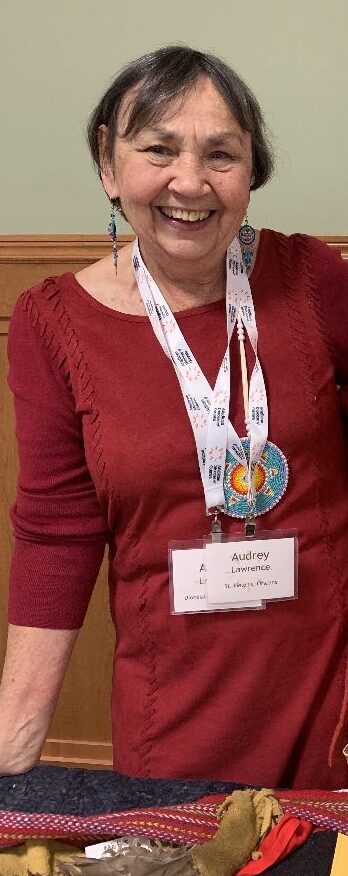Audrey Lawrence’s family history reflects many aspects of the history of Canada. Appointed in 2022 as Métis advisor to Bishop Shane Parker, Lawrence says that although she is of mixed Indigenous and non-Indigenous ancestry, “I’m not really classified as Métis anymore. I’m actually Southern Inuit because the Métis associations will not recognize anyone east of the Ottawa River.”
She explains that the Métis associations have had to make these distinctions as a part of their efforts to have their rights and land recognized, as First Nations have done. “Ontario only recognizes Métis who are from settlement areas, the same for Alberta,” she explains. “The previous Métis Association of Labrador has changed their name to the Federation of Southern Inuit, so I have to reclassify.” But the official terms don’t change the identity of Lawrence and many others of mixed ancestry. The first person of mixed heritage was probably born nine months after the arrival of Europeans, she said in an Interview with Crosstalk this summer. “It’s just that the period of contact is so large. It’s over 450 years, whereas in BC it’s only 150 years, so it’s a lot easier out west to define.”
Lawrence’s father was born in Scotland, “which is a strange place for me to be claiming Indigenous ancestry from,” she acknowledges, “but my grandfather and my great-grandfather were born in Labrador.” Her grandfather worked for the Hudson’s Bay Company. In those times, men often married or had relationships with Indigenous women, sometimes known as “country wives,” while still maintaining marriages and families in England… “But in typical Hudson Bay fashion, they only record the names of men who lived in the community. They keep no records for women and children,” Lawrence said. “So, it’s really tricky for me to try to do family trees from Labrador, but that’s where my Indigenous ancestry comes from.” She added that she has found records online of Swaffields (her maiden name} in Fogo Island in 1783, so that would be an earlier ancestor,” she explained.
In her role as an advisor to the bishop, Lawrence said she is most comfortable representing the needs of urban Indigenous people…. “Because I spent quite a long period of my life working on nothing but Indigenous policy and policy-related concerns, I’m very familiar with what are the needs of Indigenous people. And even though I’m no longer in those roles, I read the papers in detail on what’s happening and look up the articles.”
Now retired, Lawrence has had a rich and diverse career, which began as a teacher. “I went to Macdonald College for my teacher’s certificate, and taught in Noranda, Que. and Shefferville in Northern Quebec for a few years…. Half my class were Cree children brought down from James Bay and the other half were town children,” she said. Lawrence did not attend or teach in any residential schools.
She completed her bachelor’s degree at McGill University and then moved to to Calgary, where she did her master’s degree in sociology with a thesis on criminal rehabilitation. and then moved to Edmonton and worked for government and hospitals. When her parents had health problems, she moved back to Ottawa and became a director of educational services at the Civic Hospital.
Lawrence completed her MBA at the University of Ottawa in 1997 and went on to work as a senior health advisor with the Congress of Aboriginal Peoples (for Donnacona Inc.); as an Indigenous liaison co-ordinator with the Ontario government; director at the Nova Scotia Community College’s School of Health and Human Services; and executive director of the Indigenous Nurses Association of Canada. She also served as a chaplain for the Carlington Community Chaplaincy. In addition to these roles, she was also a caregiver for her husband who has since passed away as well as her son Darryl Socha, who passed away in 2016.
Because her father was in the military, Lawrence grew up with frequent moves to different parts of Canada. Her father was “a great believer in propinquity,” she said, so they attended whatever church was closest to them. “At the time of confirmation, the nearest church was an Anglican church, so I became an Anglican and have loved it ever since.”
She has been a member of the diocesan All My Relations Circle AMR) since it was created and has served as its co-chair for the past two years. Over the years, she said she has seen Anglicans’ understanding of Indigenous issues grow. “I’ve done a lot of presentations in different churches because I’ve been with AMR and it’s always responded to well,” she said, adding that in recent years more people self-identify as Indigenous.
“When the Doctrine of Discovery was declared null by the current Pope, I announced that in church and everybody applauded it. And I thought to myself, ‘I bet five or 10 years earlier, they wouldn’t even have known what that was about, so I detect big differences.”
Lawrence said she sees tremendous change in broader Canadian society as well. “There’s a lot of pride in being Indigenous now and a lot of concern, [with people] saying, ‘Now we have identified the issues, let’s start working together to resolve them, which is very important.”
Looking ahead to what Anglicans in the diocese can do to further reconciliation work, Lawrence suggested “doing a deeper dive into the issues and really identifying more of what they can do to work in partnership, either with an Indigenous community, or on continuing and deepening the understanding of the impact on Indigenous people, not just in Canada, but the whole effects of colonization throughout the world.”
Lawrence will be facilitating two sessions of PWRDF’s Mapping the Ground We Stand On” exercises with Karen Luyendyk at Julian of Norwich on Sept. 23. Please see our calendar on page 16 for details.


Week of Prayer for Christian Unity annual service to be celebrated at Saint Paul University on Jan. 22